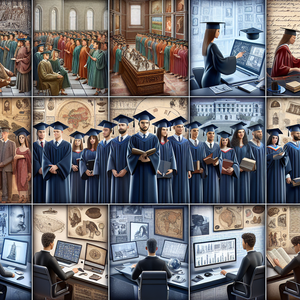
Exciting Career Pathways for History Graduates: 10-20 Opportunities to Explore
For individuals captivated by the past and keen on applying historical insights to modern-day challenges, a history degree can unlock a wide range of career possibilities. While many might associate history studies primarily with teaching and research, graduates can find rewarding positions across sectors such as government, media, cultural institutions, and business. This article delves into a variety of promising occupations that utilize the analytical, research, and communication skills developed through historical studies, providing insights into job prospects, salary ranges, and growth trends.
Job Summaries:
Historian:
- Historians conduct thorough research and analysis of past events.
- They offer insights that illuminate current societal changes.
- Their tasks include examining primary sources, conducting interviews, and publishing findings.
- Often requiring a master’s degree or Ph.D. in history.
- Historians contribute significantly to education and cultural heritage preservation.
Museum Curator:
- Curators oversee museum collections.
- Manage exhibitions.
- Design educational programs.
- Play an essential role in acquiring artifacts.
- Preserve artifacts.
- Interpret artifacts.
- A master’s degree in museum studies or history is often necessary.
- Exceptional organizational skills are required.
Archivist:
- Archivists focus on preserving and organizing historical documents and records for future accessibility.
- They typically work in libraries, museums, and government agencies.
- They require a master’s degree in archival science.
- Their attention to detail is vital for maintaining historical scholarship.
History Teacher:
- History teachers play a pivotal role in shaping students’ understanding of historical events and critical thinking skills.
- They design lesson plans, assess student progress, and create engaging learning environments.
- A bachelor’s degree in history or education, along with teaching certification, is essential for this role.
Journalist:
- Journalists with a history background can specialize in reporting on historical events or societal shifts.
- They conduct research, interview sources, and create compelling articles or multimedia content.
- A degree in journalism or communications is typically required.
Librarian:
- Librarians manage information resources.
- Aiding patrons in locating historical literature and data.
- They often work in public or academic libraries.
- Curating collections and providing research support.
- A master’s degree in library science is generally necessary.
Legal Assistant/Paralegal:
- Legal assistants and paralegals support lawyers through research, document drafting, and case management.
- A background in history equips them with valuable research and analytical skills.
- Typically, an associate’s degree in paralegal studies is required.
Public Historian:
- Public historians engage communities to promote historical awareness through educational initiatives and outreach programs.
- A master’s degree in public history is often preferred for this role.
Policy Analyst:
- Policy analysts research and evaluate policies.
- They draw on historical contexts to inform decision-making.
- They write reports and present findings to stakeholders.
- Typically requiring a degree in history or political science.
Cultural Resource Manager:
- Cultural resource managers are responsible for overseeing the preservation of historical sites and artifacts.
- Ensuring compliance with preservation regulations.
- A degree in history, archaeology, or a related field is essential.
The array of career opportunities available to history graduates showcases the versatility of their skills across various sectors. By pursuing internships, building networks, and seeking further education, history majors can navigate their career paths towards fulfilling and impactful roles.
Explore More Jobs
